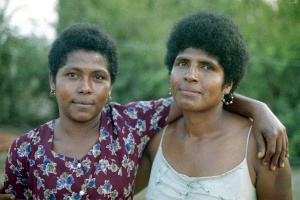Latino
[luh–tee-noh, la-]
noun, plural Latinos.
- a person of Latin-American or Spanish-speaking descent
The dictionary defines Latino as “a person of Latin-American or Spanish-speaking descent,” yet so often Latinos are believed to look a specific way, as if we are a homogenized group.
The belief is that Latinos are light skinned, sort of tan, with brown or black hair and brown eyes. When most people, especially Americans, picture Latinos, it looks something like this:

a “typical” Latino family
Or they think of well-known celebrities like Shakira, Jennifer Lopez, Sofia Vergara, or Jessica Alba.

Shakira

Jennifer Lopez

Sofia Vergara

Jessica Alba
What’s interesting is that most of these actresses and musicians are white Latinas or white-passing. Shakira is of Spanish, Italian and Lebanese descent although she was born in Colombia. Jennifer Lopez was born in NYC to Puerto Rican parents, and is white-passing. Sofia Vergara is a white Latina born in Colombia. And Jessica Alba’s father is Mexican-American while her mother is Danish and French. It’s important to note that the most well-known and represented Latinos are white Latinos.
The reality is that there is an incredible amount of diversity within the Latino community, a diversity that is not usually explored or represented. There are not only white Latinos, but also Afro-Latinos, indigenous Latinos, Mestizos, Chicanos, and many more. It is important to recognize the diversity because in countries like Cuba, Brazil, and Haiti there is a very large Afro-Latino population, and misconceptions about who is and isn’t Latino can invalidate people’s identities. For example, according to an Al Jazeera article, “more than 60 per cent of Cuba’s population of 11.2 million people is not white [but instead either black or of mixed race]”.
It’s incredibly damaging to be told that you are “Too black to be Latino” or “Too white to be Latino”, as there is really no such thing. I’ve heard strangers remark to my friends “I don’t understand, you say you’re Latina, but aren’t you black?” This way of thinking erases people’s sense of identity.
The people of Latin America have a rich history, and most Latinos can trace their ancestry back to indigenous peoples, Spain, Portugal, or Africa. No two Latinos have the same background. Instead of picturing the stereotypically whitewashed image of Latinos, picture this:



Even though I’m white, I find this post very interesting and relevant. I come from an area with a large Latino population(I was in the racial minority at my high school) and have heard opinions from all sides of this issue. I agree with a lot of what you’re saying, and this writing really puts various arguments together well and makes me feel compelled to think more deeply about race relations in the United States.
LikeLike
I really appreciate you posting this. I am a afro-latina. Born in Puerto Rico but raised the majority of my life in the states. I don’t look like Jennifer Lopez or Marc Anthony. I can pass for Black or even “mixed. It often frustrates me when I tell people what I am and they look at me like I’ve lost my mind or like I am lying. I wish more people were aware that just like there is diversity in one ethinicity, theres diversity in the Latino community.
LikeLike